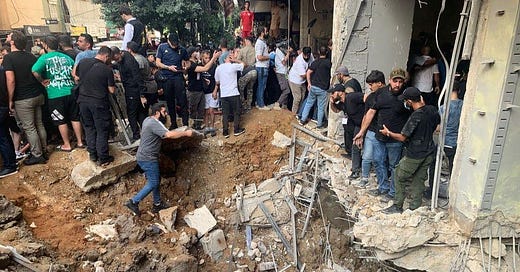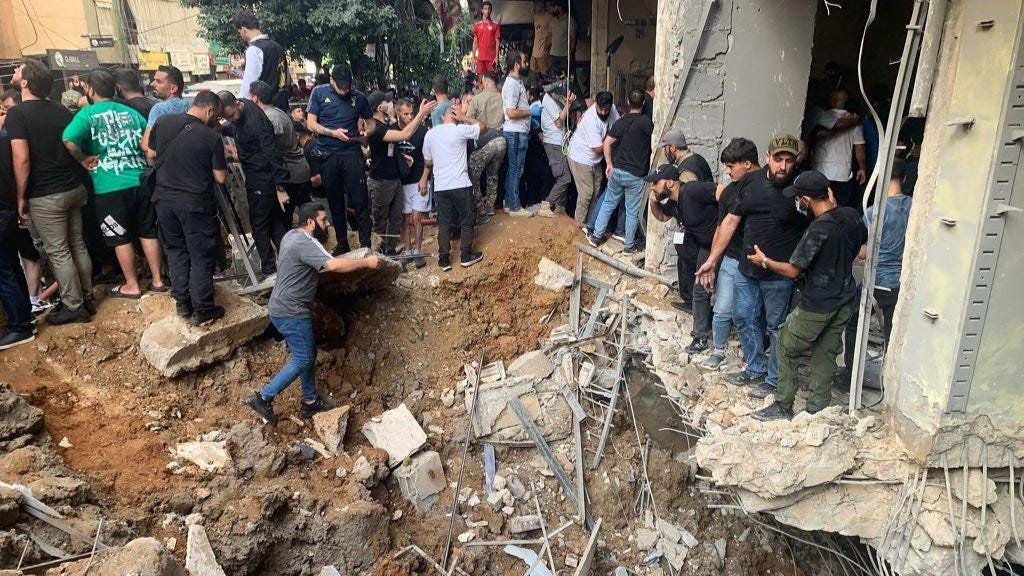Israel's Targeted Strike on Hezbollah: Senior Commander Ibrahim Aqil Among 14 Killed and 66 Injured.
Risk of a Broader Israel-Lebanon Conflict Escalting
Israel's Targeted Strike on Hezbollah: Rising Tensions in the Middle East
In a significant escalation of the ongoing conflict between Israel and Hezbollah, an Israeli airstrike on Friday targeted the southern Beirut suburb of Dahieh, a known Hezbollah stronghold, killing senior commander Ibrahim Aqil. This strike comes after a particularly violent week in Lebanon, exacerbating fears of a broader regional conflict. The death of Aqil, along with several other Hezbollah operatives, has raised alarm both within Lebanon and internationally, as tensions mount and both sides prepare for potential further hostilities.
The Airstrike and Immediate Aftermath
The Israeli airstrike hit a residential area in the Jamous district of Beirut, collapsing one building and severely damaging another. Lebanese officials reported at least 14 fatalities, including several Hezbollah members. The Israel Defense Forces (IDF) confirmed that the operation aimed to eliminate key Hezbollah leaders, specifically Ibrahim Aqil, a commander involved in Hezbollah’s militant operations since the 1980s.
Hezbollah acknowledged Aqil’s death, describing him as a "great martyr" who had dedicated his life to the cause of Jerusalem. “Jerusalem was always in his heart, mind, and thoughts day and night,” the group said in a statement. Hezbollah also confirmed the deaths of other operatives during the strike, further heightening the group's resolve against Israel.
Airstrike Follows Series of Devastating Explosions
Coming on the heels of a series of pager explosions that injured numerous Hezbollah operatives, followed by walkie-talkie battery explosions, these latest air raids were not only anticipated but also boldly announced in advance by Israeli authorities. With growing bravado, Israel signaled its intent to intensify its strikes against Hezbollah's infrastructure. In response, Hezbollah has vowed revenge, further escalating tensions and bringing the region to the brink of a broader conflict. The anticipation of retaliatory attacks has raised fears of a full-scale confrontation, as both sides seem poised for further escalation.
Ibrahim Aqil’s Role and Regional Implications
Ibrahim Aqil was a significant figure within Hezbollah's military hierarchy, serving on the group’s military council and overseeing operations for over two decades. His involvement in several high-profile attacks, including the 1983 bombings of the U.S. Embassy and the U.S. Marine Corps barracks in Beirut, made him a wanted figure by the United States. His assassination marks a critical blow to Hezbollah’s leadership, though analysts caution that the group is well-versed in replacing senior commanders without major disruptions.
"The killing of Aqil is a huge blow for Hezbollah, but it’s unlikely to cripple their operations long-term," said Amal Saad, a Hezbollah expert. While Israel may aim to erode Hezbollah’s capabilities, the group’s deep-rooted support and adaptability make it difficult to dismantle entirely.
Strategic Implications and Risks of Escalation
Israel’s airstrike on Hezbollah comes amid ongoing operations in Gaza, reflecting a broader strategy to weaken its regional adversaries. By targeting Hezbollah’s leadership and communication networks, Israel aims to reduce the group’s ability to launch attacks on Israeli territory. However, this aggressive approach risks provoking a larger regional conflict. Hezbollah has already vowed retaliation, and Lebanon, already grappling with political and economic crises, faces further destabilisation.
Jeanine Hennis-Plasschaert, the United Nations special coordinator for Lebanon, warned of the dire consequences of continued violence. “We are witnessing a dangerous cycle of violence with devastating consequences,” she said, urging restraint from all parties involved.
Israel's Strategic Calculations: Long-Term Impact
From Israel’s perspective, these strikes are intended to protect its northern border and curb Hezbollah’s influence. Defence Minister Yoav Gallant affirmed that these operations are part of a broader strategy to prevent future attacks. However, some analysts question whether Israel’s long-term goals are achievable through military means alone. Israeli columnist Nahum Barnea raised a critical point, asking, "There is technology. Is there strategy?" While Israel has demonstrated technical capabilities in disrupting Hezbollah’s operations, the overall strategic impact remains uncertain.
International Response: Calls for Restraint
The international community, particularly the United States, has expressed concern over the escalating conflict. During a U.N. Security Council meeting held in New York, members urged all parties to exercise restraint. Rosemary DiCarlo, the undersecretary general for political and peace-building affairs, highlighted the grave risks posed by the conflict, warning, “The risk of further expansion of this cycle of violence is extremely serious, and poses a grave threat to the stability of Lebanon, Israel, and the whole region.”
U.N. High Commissioner for Human Rights Volker Türk condemned the attacks, particularly the indiscriminate use of cyberattacks that resulted in mass casualties. “Simultaneously targeting thousands of individuals, whether civilians or members of armed groups, without knowledge as to who was in possession of the targeted devices, violates international human rights law,” he said.
Lebanese Foreign Minister Abdallah Bou Habib, speaking at the U.N., emphasised the need for global action, stating that "no one in this world is safe anymore" after the cyberattacks in Lebanon. U.S. representative Robert Wood also called for diplomatic efforts to prevent further tragedy, accusing Iran of enabling Hezbollah to undermine regional stability.
U.S. Defence Secretary Reiterates Commitment to Israel Amid Escalation
Pentagon Press Secretary stated that U.S. Secretary of Defense Lloyd J. Austin III spoke with Israeli Minister of Defense Yoav Gallant, expressing concern over the growing tensions between Israel and Hezbollah in Lebanon. Secretary Austin underscored the importance of pursuing a diplomatic solution that would allow residents on both sides of the Israel-Lebanon border to safely return to their homes. Additionally, he urged continued efforts to secure a ceasefire in Gaza, emphasising the priority of bringing home hostages held by Hamas. Austin reaffirmed the United States' unwavering and ironclad commitment to Israel's security throughout these ongoing challenges.
Conclusion: On the Brink of a Broader Conflict
The death of Ibrahim Aqil highlights the fragile situation in Lebanon and the broader Middle East. While Israel’s actions aim to neutralise perceived threats, the potential for a wider regional war looms large. Both Hezbollah and Israel are preparing for possible escalations, raising concerns that the conflict could spiral out of control.
As Stéphane Dujarric, spokesperson for the U.N. secretary general, aptly warned, “The region is on the brink of a catastrophe.” The coming days and weeks will be critical in determining whether diplomacy can prevail or if the region will be plunged into a larger, more devastating conflict.
Key Quote:
“It is a war crime to commit violence intended to spread terror among civilians,” said U.N. High Commissioner for Human Rights Volker Türk, reflecting on the broader implications of the ongoing violence in Lebanon.






ਮਨੁੱਖ ਨੇ ਜਿੰਨਾ ਵੀ ਵਿਗਿਆਨਕ ਵਿਕਾਸ ਕੀਤਾ ਹੈ ਉਹ ਓਨਾ ਹੀ ਵਿਨਾਸ਼ ਭਰਿਆ ਵੀ ਹੈ । ਪ੍ਰਮਾਤਮਾ ਦਾ ਨਾਮ ਹਮੇਸ਼ਾਂ ਮਨ ਨੂੰ ਠੰਢਕ ਦਿੰਦਾ ਹੈ ਅਤੇ ਸਮੂਹ ਦੁੱਖਾਂ ਤੇ ਕਲੇਸ਼ਾਂ ਤੋਂ ਬਚਾਉਂਦਾ ਹੈ ਪਰ ਮਨੁੱਖ ਇਸ ਤੋਂ ਦੂਰ ਹੁੰਦਾ ਜਾ ਰਿਹਾ ਹੈ। ਬੰਬਾਂ ਵਿੱਚੋਂ ਅੱਗ ਦੇ ਗੋਲੇ ਨਿਕਲਣਗੇ ਨਾਂ ਕਿ ਪਵਿੱਤਰ ਕੜਾਹ ਪ੍ਰਸ਼ਾਦ